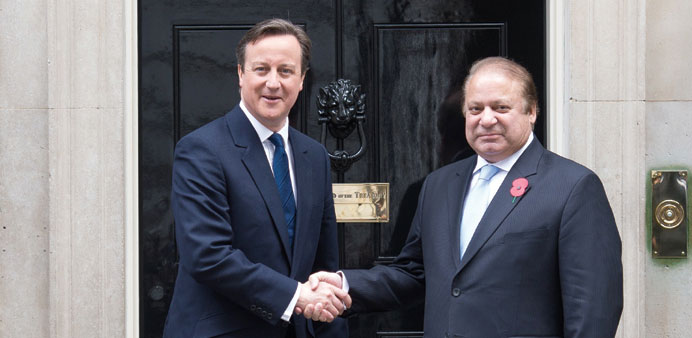British Prime Minister David Cameron greets Pakistan’s Prime Minister Nawaz Sharif outside 10 Downing Street in central London yesterday ahead of their meeting. Pakistani Prime Minister Nawaz Sharif has ordered an investigation into the killing of prominent rights activist Sabeen Mahmud who was shot dead minutes after she hosted a seminar on abuses in troubled Baluchistan province.
AFP/Islamabad
Pakistani Prime Minister Nawaz Sharif has ordered an investigation into the killing of prominent rights activist Sabeen Mahmud who was shot dead minutes after she hosted a seminar on abuses in troubled Baluchistan province.
Police said Mahmud, who runs The Second Floor, a cafe in Karachi that organises debates and art events, was killed late Friday when gunmen attacked her car as she departed with her mother from the venue in the upmarket Defence neighbourhood.
Mahmud was hit by five bullets and died at the scene, police said. Her mother was wounded.
Mama Abdul Qadeer, a prominent Baluch rights activist and a speaker at the seminar, said Mahmud had received threats before the event.
“The programme organisers were already receiving threats.... it is very difficult to talk about Baluchistan in Pakistan,” Qadeer said yesterday.
Police initially said it appeared to be “a result of personal enmity” but launched a probe after Sharif ordered an investigation into her killing.
“A team of three senior police officers headed by the deputy inspector general of police will probe the killing,” Atique Ahmed Shaikh, a spokesman for Karachi police, said.
Tariq Dharajo, another senior police official, said no one had yet been arrested and police were investigating different angles.
He said Mahmud’s mother told police yesterday that attackers on a motorbike opened fire after they stopped their car at a traffic signal.
Mahmud had on Friday hosted a seminar about rights abuses in Baluchistan titled “Un-silencing Baluchistan Take 2”, featuring two prominent Baluch rights activists, Qadeer and Farzana Baluch, among other speakers.
Qadeer and Baluch were meant to speak at another seminar, “Un-silencing Baluchistan”, at the prestigious Lahore University of Management Sciences about two weeks ago, but rights activists said it was cancelled apparently at the behest of the powerful Inter Services Intelligence (ISI) agency.
Qadeer said he received death threats because of speaking against human rights violations in Baluchistan.
“I am constantly receiving threats from unknown telephone numbers. The situation is becoming worse. Now the agencies are meeting me directly and asking me to stop all this practice,” Qadeer said.
“When you talk about the human rights you are considered as a traitor,” he added.
In March Qadeer was stopped from attending a conference in the United States to speak on the rights situation in his province.
Resource-rich Baluchistan is the largest of Pakistan’s four provinces, but its roughly 7mn inhabitants have long complained they do not receive a fair share of its gas and mineral wealth.
Human rights groups allege the security forces commit abuses, accusing them of picking up non-militant separatists — including academics and students — torturing them and dumping their bodies on the streets.
The security services deny the allegations and say they are battling a fierce rebellion in the province.
Military spokesman Major General Asim Bajwa condemned the killing as “tragic and unfortunate” and tweeted that intelligence agencies have been tasked to assist the investigation.
The killing comes as Beijing and Islamabad this week signed an agreement to create the China-Pakistan Economic Corridor, a $46bn project linking China’s restive west to the Arabian Sea through Pakistan as part of Beijing’s plans to expand its trade and transport footprint across Central and South Asia.
The project dwarfs previous efforts to assist Pakistan’s underperforming economy, but analysts have cautioned that the lion’s share of the returns would likely go to China.
But Baluch rebels oppose development of the key Gwadar port while Baluchistan is not independent and refuse for the time to reach a peace dialogue.

